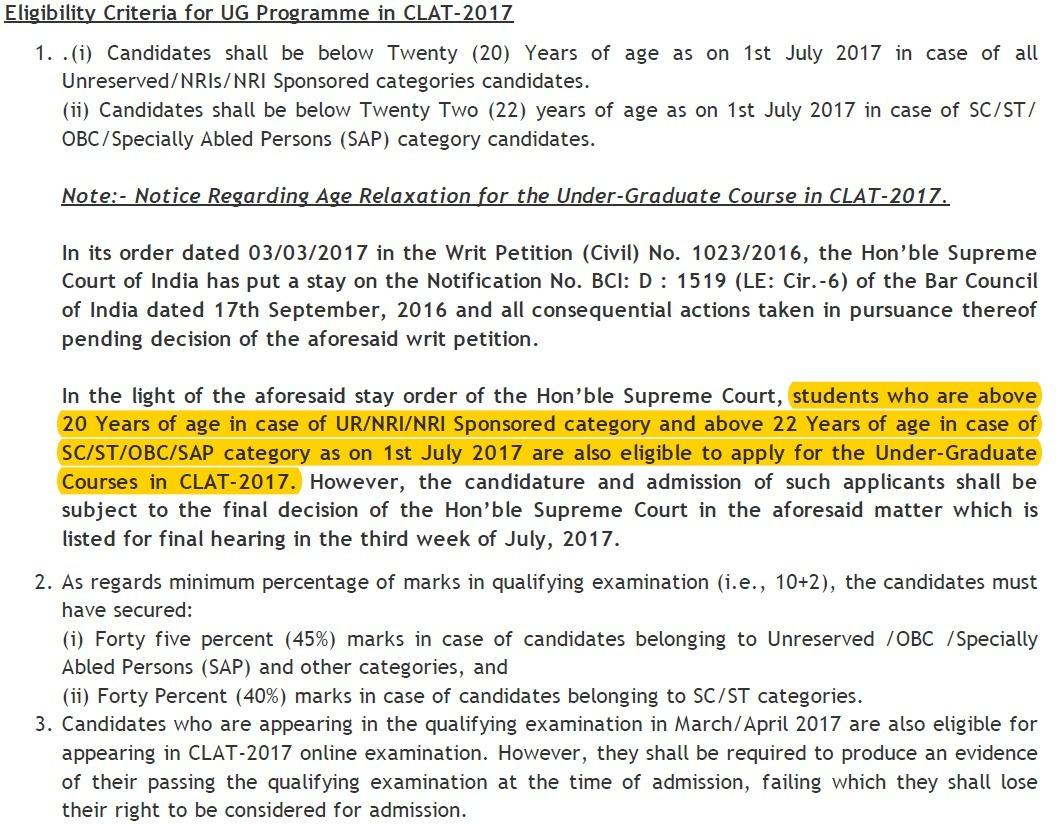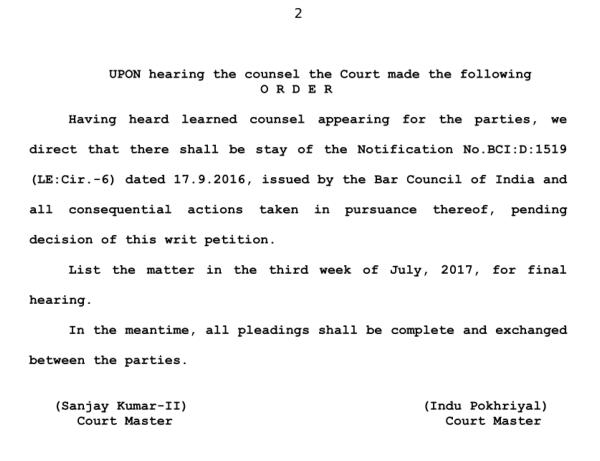
After having left students on tenterhooks and without information for 7 days after the Supreme Court had unequivocally stayed the Bar Council of India (BCI) age limit on studying law, the Common Law Admission Test (CLAT) convenor CNLU Patna finally issued a formal notification that, in line with the decision of the apex court and two high courts, students over the age of 20 would indeed be able to study law.
One candidate over the age of 20, who with 69 others had won the right to study law before the Allahabad high court in the decision we reported on 9 February, told us two days ago that students older than 20 had been contacting the CLAT office in vain since both the high court and the Supreme Court judgment, to finally get the green light to be able to submit their application forms online.
However, the student said that the CLAT committee either refused to respond or said that it had not received formal notification from the BCI.
With the 31 March CLAT application deadline approaching, Holi court holidays coming up and aspirants busy preparing for the exam, a number of them took to Facebook to complain, according to messages on a private group we have seen.
Sushmita Mukherjee, the advocate for the 70 successful petitioners in the Allahabad high court, and Zoheb Hossain, the advocate-on-record in the interim success in the Supreme on behalf of three aspirants, had also both confirmed the CLAT’s delay to us.
Mukherjee told us on Wednesday that she was considering filing contempt proceedings against CNLU in the coming days for “willful non-compliance of the directions, despite sufficient service upon it and repeated telephonic conversations”.
Hossain said that he would be writing to the universities to comply with the SC order.
On Wednesday evening (8 March) we had reached out for comment to CNLU vice chancellor A Lakshminath and BCI chairman Manan Kumar Mishra.
We did not receive any response.
Parthian shot fired?
However, even today’s eventual recognition and notification of the age limit’s stay by CNLU, may still be in violation of the Supreme Court’s directive, noted Hossain.
The CLAT’s notification and amended eligibility rules stated:
However, the candidature and admission of such applicants shall be subject to the final decision of the Hon’ble Supreme Court in the aforesaid matter which is listed for final hearing in the third week of July, 2017.
While that complies with the final written order (see below), Hossain said that the apex court bench had orally explicitly disagreed in court with the BCI’s suggestion that the entry of students should remain conditional on the final outcome of the case.
“Justice Bobde had categorically rejected the Bar Council’s submission to make the admissions subject to the outcome of the writ petition and had said that on the contrary they will not do so,” he said.
We had also reported Hossain’s recollection of that at the time of the hearing, on 3 March.
"The Supreme Court had clearly refused to make the admissions subject to the outcome of the writ petitions so the CLAT committee has to be apprised of this mistake, which I intend to do by writing a representation on behalf of my clients,” he added today.
Then again, Hossain calling it a mistake is either charitable or diplomatic.
The CLAT’s addendum could potentially retrospectively kick students out of law degrees, possibly after having invested years of their lives into LLBs.
Keeping the outcome of a Supreme Court case hanging over students’ heads is therefore either simple cruelty, or, alternatively, a deliberate attempt to continue discouraging older students from law, particularly after the BCI’s suggestion of that contingency in open court.
Either option doesn’t make the CLAT or the BCI look great, particularly after having fought the age limit tooth and nail for months now, without having ever provided a compelling reason or data in favour of it before a court.

threads most popular
thread most upvoted
comment newest
first oldest
first
Why don't you use Chandamama references?
1. Kian is 'firang', so no chandamama references;
2. BCI will probably never understand the reference to the 'sword of Damocles'. Which could be a good way to avoid the another stinker from the Mishraji but at the heavy cost of entertainment.
It's been a while since BCI demonstrated its exceptional understanding of English.
1) Should we go by India Today and Outlook Rankings? In some things they are right (such as NLSIU and NALSAR as best) but some of the ranks are confusing.
2) Which has best placements and average package?
3) What about campus, infra, location etc?
4) Among non-NLUs, what about Jindal versus Symb versus Amityi? Is it worth paying so much money for Jindal? Is only faculty good or placements also good?
Thanks for your feedback, Well wisher. Yes, you're right, we've been a little slow lately, but I've been doing some soul searching and working hard on pivoting LI slightly to make it more purposeful and sustainable going forward.
I hope you'll like it once it's done, but please let me know the feedback on what you'd like to read too.
www.legallyindia.com/views/entry/an-attempt-at-a-new-comprehensive-law-school-ranking#comments
Ultimately, I don't really believe in rankings since things are too simple to just condense into a numbers game. That said, yes, amongst the NLUs there are rough tiers of quality and popularity, vaguely in line with the long-established preferences of candidates:
www.legallyindia.com/lawschools/clat-2016-early-preferences-first-timer-nlu-mumbai-squeezes-in-with-gnlu-hnlu-so-could-nlu-delhi-make-the-top-3-20160601-7658
However, a large part of your choice should also be governed by location and other factors (which is probably why Mumbai NLU is so high in the rankings, despite being quite a risky bet right now).
What rankings have you seen that make sense to you?
threads most popular
thread most upvoted
comment newest
first oldest
first